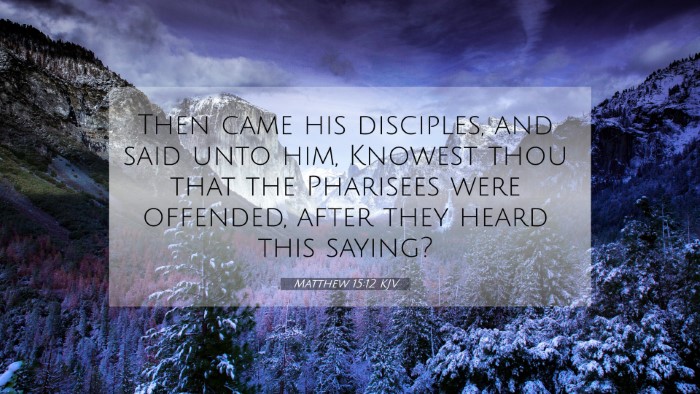Understanding Matthew 15:12
Verse: "Then came his disciples, and said unto him, Knowest thou that the Pharisees were offended, after they heard this saying?" (Matthew 15:12)
This verse serves as a pivotal moment in the narrative of Jesus' ministry, providing insight into the reactions of His disciples and the broader context of His teachings. To grasp its meaning, we will explore interpretations from public domain commentaries, along with relevant cross-references that enhance our understanding of Scripture.
Summary of Insights from Commentaries
Matthew Henry's Commentary
Matthew Henry highlights the disciples’ concern for the Pharisees, indicating their awareness of social and religious tensions. The disciples’ question reflects a common human inclination to worry about the feelings of others, especially religious leaders. Henry emphasizes that this incident illustrates the clash between Jesus’ radical teachings and the established religious order.
Albert Barnes' Notes
Albert Barnes draws attention to the significance of the disciples’ inquiry regarding the Pharisees’ offense. He notes that the Pharisees were deeply entrenched in tradition, and Jesus' words often challenged their authority and practices. Barnes stresses that this moment reveals the growing separation between Jesus and the religious elite, aiming to show that truth must prevail over tradition.
Adam Clarke's Commentary
Adam Clarke provides a detailed historical context, noting that the Pharisees were respected among the Jewish people. Clarke points out that the disciples' question highlights their concern for Jesus' safety and acceptance among the Jewish leaders. He extends the implication of offense to suggest that truth can be offensive, especially to those who hold power.
Key Themes and Interpretations
From the combined insights of these commentaries, we can derive several key themes:
- Reaction to Truth: The Pharisees' offense signifies a resistance to the truth presented by Jesus, reflecting the struggle between divine revelation and human tradition.
- Discipleship Concerns: The disciples' inquiry shows their misguided attempt to gauge the appropriateness of Jesus' directness in teaching.
- Authority of Jesus: This verse underscores Jesus’ authority to speak truth, irrespective of popular opinion or the offense it may cause.
Related Bible Verse Cross-References
To deepen our understanding of Matthew 15:12, here are relevant cross-references:
- Matthew 15:1-9: This passage introduces the confrontation with the Pharisees regarding tradition versus God’s commandment.
- Matthew 23:13-36: Here, Jesus delivers a scathing rebuke against the Pharisees, affirming His stance against their hypocrisy.
- John 8:43-47: Jesus speaks about the rejection of truth by the Pharisees, reinforcing their inability to accept His word.
- Mark 7:6-8: This parallel passage provides additional insight into Jesus’ teachings and the outward vs. inward purity debate.
- Luke 11:42-44: Jesus again addresses the Pharisees' misplaced priorities, illustrating their neglect of true justice and love.
- Acts 5:29: This verse echoes the theme of obeying God rather than human authorities, a principle at play in the conflict with the Pharisees.
- Romans 12:2: The encouragement to not conform to the patterns of this world resonates with Jesus' challenge to the status quo.
Thematic Bible Verse Connections
Understanding Matthew 15:12 through these references allows us to explore broader themes in Scripture:
- Resistance to God’s Authority: Many verses throughout both Old and New Testaments illustrate how true faith often stands in contrast to established traditions.
- The Importance of Inner Righteousness: Jesus emphasizes a change of heart over ritual compliance, as seen in Jeremiah 7:21-23 and 1 Samuel 15:22.
- Jesus’ Role as the Revolutionary Teacher: His teachings continue to challenge religious norms, which can be linked to verses like Mark 2:17 and Luke 10:25-37.
Conclusion: The Importance of Cross-Referencing in Bible Study
Matthew 15:12 challenges readers to reflect on their responses to truth and the influence of tradition on faith. By employing a cross-reference system and engaging with each verse’s context, we can deepen our understanding and appreciation of God’s word. Whether preparing for a sermon or personal study, the tools for biblical cross-referencing enhance our grasp of interconnected themes and messages throughout Scripture.








